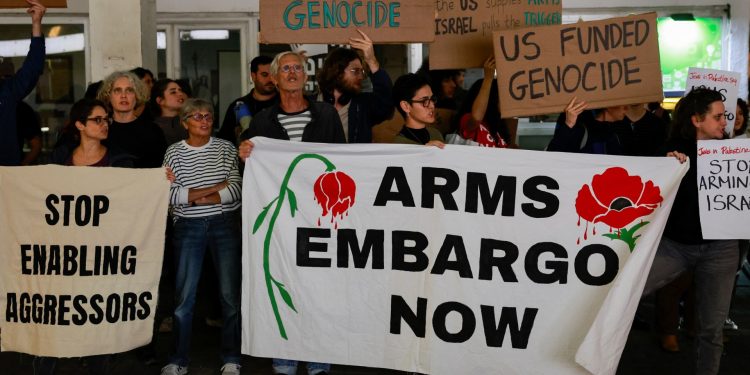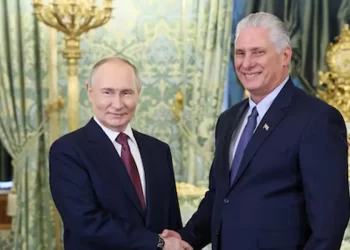The arrest warrants against Netanyahu and Gallant could lead to countries rethinking selling arms to Israel, experts say.
Western nations which sell arms to Israel may be forced to re-evaluate their trade agreements after arrest warrants issued by the International Criminal Court (ICC) against Israeli Prime Minister Benjamin Netanyahu and his former Defense Minister Yoav Gallant for “war crimes” and “crimes against humanity” in Gaza, experts say.
The warrants came amid Israel’s continuing bombardment and military campaign on the Gaza Strip, where more than 44,000 Palestinians have been killed since October 7, 2023, according to health officials.
All 124 countries which are signatories to the Rome Statute of the ICC are now legally obliged to arrest Netanyahu and Gallant if they set foot on their territory.
The question of whether countries supplying arms to a country whose leaders are accused of crimes against humanity could be considered complicit is unclear, but experts say some suppliers will have to consider carefully if they wish to continue to support Israel in its war on Gaza.
Stockholm International Peace Research Institute (SIPRI) estimated that between 2019 and 2023, Israel was the 15th largest importer of arms globally.
It said the United States, Germany, the United Kingdom, France and Spain export arms to Israel.
A United Nations report published on February 23, 2024 says Canada and Australia have also exported weapons to Israel.
Israel imported 69 percent of its weapons from the US between 2019 and 2023, according to SIPRI. The principle of ensuring that Israel has a “qualitative military edge” was enshrined in US law in 2008.
So far, the US, which is not a signatory to the Rome Statute of the ICC, has shown no signs of being prepared to reduce or halt weapons to Israel. “We fundamentally reject the court’s decision to issue arrest warrants for senior Israeli officials,” White House spokeswoman Karine Jean-Pierre told reporters. This sentiment was shared by many politicians from both parties in the US.
SIPRI estimates weapons sent by Germany constitute 30 percent of Israel’s weapon imports, a tenfold rise in 2023 compared with 2022. Germany mostly sends naval equipment to Israel, including frigates and torpedoes.
In March, Nicaragua filed a case at the International Court of Justice (ICJ), asking the court to order Germany to immediately stop exporting arms to Israel because “this aid is used or could be used to commit or to facilitate serious violations of the Genocide Convention, international humanitarian law or other peremptory norms of general international law”.
On April 30, the court rejected the request, saying the monetary value of the weapons for which Germany granted export licences had decreased. In June, several Palestinians in Gaza filed requests to an administrative court in Berlin to stop the German government from exporting weapons. These requests were also rejected.
In September, a spokesperson for the German Ministry for Economic Affairs said: “There is no German arms export boycott against Israel.”
Which countries provide arms to Israel?
SIPRI data shows that while the UK has not provided Israel with major arms since the 1970s, it has provided components for various systems such as the F-35 combat aircraft.
“No lethal or other military equipment has been provided to Israel by the UK Government since 4 December 2023,” then-Minister of State for the Armed Forces Leo Docherty told Parliament in April 2024.
According to data by SIPRI, France did not send weapons to Israel between 2019 and 2023, and the last time it sent weapons was in 1998.
However, France does supply components used to build weapons.
In June, French investigative media website, Disclose, revealed that France had sent electronic equipment for drones suspected of being used to bomb civilians in Gaza.
In October, French President Emmanuel Macron told French media: “I think that today, the priority is that we return to a political solution, that we stop delivering weapons to fight in Gaza.” He added: “France is not delivering any.”
SIPRI estimates that Italy’s weapons sent to Israel accounted for 0.9 percent of Israel’s weapons imports between 2019 and 2023. Italy mostly sent light helicopters and naval guns.
The Italian government made repeated assurances that Italy had not sent weapons to Israel since the war broke out.
Prime Minister Giorgia Meloni said in the Italian Senate in October this year: “The government immediately suspended all new export licences, and all agreements signed after October 7th [2023] were not implemented.”
However, in March this year, Italian Defence Minister Guido Crosetto said despite these assurances, Italy had sent some weapons to Israel.
Crosetto said these were the weapons for which orders were signed before October 7.









